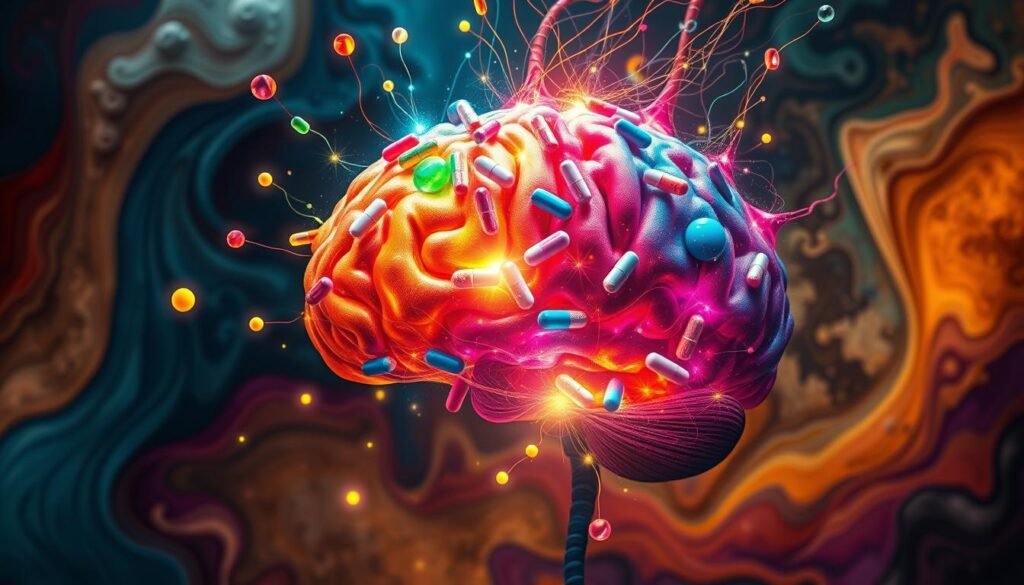Did you know that having ADHD makes you almost three times more likely to feel depressed? This fact highlights how mental health issues are connected. It makes us take a closer look at treatment options. Vyvanse (lisdexamfetamine) is a drug mainly for ADHD and binge-eating. But, people are asking: can it also help with depression?
In this discussion, we’ll look into how Vyvanse works, its possible pros, and what mental health experts think. There’s a growing interest in using medications like Vyvanse for other mental health problems. We aim to give you detailed insights on using Vyvanse for depression, and what that means for mental health.
Key Takeaways
- Vyvanse is mainly for treating ADHD and binge-eating disorder.
- It might help with depression symptoms, but more studies are needed.
- Understanding ADHD and depression together is key for good treatment.
- Experts are exploring if Vyvanse could work as an antidepressant.
- Vyvanse and similar medicines have benefits and risks.
- Monitoring its use for mental health is very important.
Introduction to Vyvanse and Its Uses
Vyvanse is a top choice for managing ADHD and binge eating disorder. It helps adults and kids six years and up. The key ingredient, lisdexamfetamine dimesylate, is a stimulant that boosts norepinephrine and dopamine in the brain.
After swallowing, Vyvanse activates in the digestive system. It turns into dextroamphetamine to help the body. People take it in the morning for effects that last 10 to 12 hours. This helps them control symptoms all day.
Vyvanse is only sold under its brand name and comes in doses ranging from 10mg to 70mg. Side effects like anxiety, less hunger, or dry mouth may occur. Yet, it can also lead to heart issues or mental health problems.
Consulting a doctor is key before starting Vyvanse, especially for those with heart or mental health histories. While it’s mainly for ADHD, Vyvanse also helps with mood regulation. Knowing the pros and cons of lisdexamfetamine dimesylate is vital for making informed health choices.
Understanding Depression and Its Symptoms
Depression is known as a mood disorder. It comes with ongoing sadness and a lack of interest in usual activities. Along with depression symptoms, it can deeply affect daily living. Symptoms often include being very tired, sleep changes, and having trouble thinking clearly or making choices. These aspects are key to understanding how individuals with mental health issues experience their day-to-day lives.
Depression deeply impacts people’s lives. Major Depressive Disorder (MDD) is a common type, affecting many worldwide. There are also milder forms, like Dysthymia, with long-term, but less severe symptoms. A study found that people with either ADHD or MDD are likely to have the other too. This shows the complex ways different mental health conditions interact.
It’s critical to tackle the complexities of depression. The condition can greatly lower the quality of life. A huge 98% of those affected say depression feels worse than terminal illnesses. Understanding these disorders helps create better treatments. This can lead to better health outcomes for those affected.
Does Vyvanse Help With Depression
Vyvanse and depression are often explored together by many researchers. Vyvanse is used mainly for treating ADHD and binge eating disorder. Its ability to lift mood makes people wonder if it can help those with depression. Knowing how Vyvanse works helps us see how it might ease depression.
Overview of Vyvanse’s Mechanism of Action
Vyvanse, or lisdexamfetamine, boosts the levels of norepinephrine and dopamine in the brain. These are neurotransmitters that affect mood and focus. Because of this, Vyvanse might help improve mood. While it’s mainly for ADHD, it could also help those feeling depressed, raising the question of its effectiveness against depression.
Research Insights on Vyvanse and Depression
Recent studies have begun to look at how Vyvanse relates to depression. These studies show that people with past depression could benefit similarly to others. This means Vyvanse might not only help with ADHD but could also help in regulating mood. However, we need more research with more people to be sure of its impact on depression.
| Aspect | Details |
|---|---|
| Primary Uses | ADHD in children and adults, binge eating disorder |
| Mechanism | Enhances norepinephrine and dopamine levels |
| Research Findings | Potential mood elevation for individuals with depression |
| Need for Further Study | Larger studies required to substantiate current findings |
Vyvanse Effects on Depression in Adults
Learning about Vyvanse and its impact on adults with depression is useful. It helps us see the good and the not-so-good sides. Studies show it might help people who have ADHD and feel depressed. They notice better moods and more focus in their day-to-day lives.
Data from Clinical Trials
Research into Vyvanse’s impact on depression is eye-opening. Those in the studies saw better scores on ADHD tests. It means they could focus better and felt happier. People with ADHD and depression felt better with Vyvanse. This suggests it helps with their emotions too.
Comparative Analysis with Traditional Antidepressants
Comparing Vyvanse with old-school antidepressants reveals some differences. Old antidepressants take time to work, sometimes weeks. Vyvanse can work faster for some. The side effects vary too. While old antidepressants might cause weight gain or sexual issues, Vyvanse may lead to less hunger and anxiety. This difference could affect how well patients stick to their treatment.

Comorbidities: ADHD and Depression
ADHD and depression are deeply connected, affecting how we handle mental health. Roughly one in three people with ADHD also face depression. This combination makes finding the right treatment essential.
Impact of ADHD on Mental Health
Boys often have hyperactive-impulsive ADHD, while girls may have mainly inattention issues. When ADHD isn’t treated, it can increase the chance of also getting depression. This is due to several reasons, including biology and life experiences. Common signs like lower motivation and trouble with daily tasks add to the struggle.
Managing Coexisting Conditions with Vyvanse
Vyvanse is a medication that could help with both ADHD and depression. Research supports its use for better focus and mood control. Handling ADHD well usually means using many methods together, like medicine and therapy. Tailoring treatment to each person can greatly improve their life.
Off-Label Use of Vyvanse for Depressive Symptoms
Vyvanse is mainly known for treating ADHD, but now it’s also used for depression. Doctors are looking at it to help people who don’t feel better with usual antidepressants. Let’s dive into how it’s prescribed, its potential perks, and the risks involved.
Common Practices in Prescribing Vyvanse
Doctors prescribe Vyvanse off-label for depression symptoms that aren’t full-blown major depression. Studies have looked at it as an extra treatment to help improve mood and brain function in adults. One study with 143 people found it effective for both unipolar and bipolar depression.
Potential Benefits and Risks of Off-Label Use
Doctors think about many things before prescribing Vyvanse for depression, such as the good it can do. Some research shows it really helps with mood and how the brain works. One study even saw big improvements in mood scores.
- Benefits: Better mood, thinking, and daily functioning.
- Risks: Possible side effects include trouble sleeping, feeling irritable, and gaining weight.
- Considerations: It’s important to watch for any new or worsening side effects.
Doctors always need to balance the good against the possible bad effects, with patient safety in mind.

| Study Aspect | Placebo Group | Vyvanse Group |
|---|---|---|
| Participants | 59 | 60 |
| Mean BRIEF-A GEC T Score at Baseline | 74.2 ± 8.88 | 76.8 ± 9.66 |
| Mean BRIEF-A GEC T Score at End of Study | 61.4 ± 14.61 | 55.2 ± 16.15 |
| LS Mean Treatment Difference | – | -8.0 (−12.7, −3.3) |
| Treatment-emergent Adverse Events Rate | 73.6% | 78.9% |
| Serious Treatment-emergent Adverse Events Rate | 4.2% | 2.8% |
Expert Opinions on Vyvanse as an Antidepressant
Mental health experts have different views on Vyvanse for depression. It’s mainly for ADHD, but now some see its value for major depression. Studies show it might help people who haven’t found relief otherwise.
Comments from Mental Health Professionals
Clinical findings show Vyvanse may benefit those not helped by other antidepressants. A study with 246 people found improvements in some after six weeks. Experts saw a notable decline in depression scores versus placebo.
Patient Experiences and Anecdotal Evidence
Patients often feel more motivated and less tired with Vyvanse. It helps with depression signs like too much sleep or poor focus. However, some report side effects like dry mouth and less hunger. They emphasize the role of medication and therapy together for the best results.
Long-Term Effects of Vyvanse on Mental Health
Understanding the long-term effects of Vyvanse on mental health is key for individuals taking or thinking about this medication. Vyvanse is often prescribed for ADHD and binge eating disorder. It can impact cognitive outcomes and emotional health over time. Knowing these effects is important to determine if it’s right for long-term use.
Cognitive and Emotional Outcomes
Vyvanse’s prolonged use can lead to changes in cognitive function and emotional well-being. Some people might see improvements in focus and less impulsivity. However, risks include tolerance and dependence. Misuse of Vyvanse can worsen cognitive outcomes, negating the benefits. Symptoms like anxiety, insomnia, and irritability can harm emotional health.
Considerations for Long-term Use
Long-term Vyvanse use has several considerations. It’s a Schedule II controlled substance, indicating addiction risk. This could lead to severe emotional and cognitive issues. Dependence might cause symptoms that affect one’s life, including extreme agitation and heart problems. Understanding the long-term effects of Vyvanse deeply is crucial for those thinking about long-term treatment. Seeing a healthcare professional regularly helps manage risks while aiming for cognitive and emotional strength.

Evaluating the Risks of Using Stimulants for Depression
Vyvanse can help some people with depression, but it has risks. It’s important to know the risks of Vyvanse. These include side effects and the chance of becoming addicted.
Common Side Effects of Vyvanse
Vyvanse users might face several side effects. These are due to its stimulant nature. Side effects include:
- Anxiety
- Insomnia
- Increased heart rate
- Dry mouth
- Loss of appetite
- Potential cardiovascular issues
These side effects of stimulants can hurt your mental and physical health. They can make daily life hard, especially if you’re already dealing with depression.
Potential for Substance Abuse and Dependence
More college students now use stimulants like Vyvanse without a prescription. This raises substance abuse concerns. Here are some stats:
- Studies show 2% to 8% of undergrads use stimulants they haven’t been prescribed.
- A survey from a northeastern university revealed 34% of students took amphetamines without a prescription.
- At a mid-western university, self-reported amphetamine use jumped from 5% to 9% between 2003 and 2013.
It’s risky to mix Vyvanse with antidepressants because of severe side effects. There’s a misleading belief that it’s safe to use stimulants without medical advice. This is especially risky for young people who might not fully recognize the risks of Vyvanse.
Conclusion
Vyvanse has shown promise in treating depression, especially in those with ADHD. It’s just as effective as other treatments and usually causes no major side effects. About 6.1 million people in the U.S. have ADHD, so it’s key to see how it affects mental health.
People who have had depression or issues with substance use might find Vyvanse helpful. But, we need more research to be sure it’s safe for everyone. Large studies will confirm how well it works across different groups.
Talking to healthcare providers is crucial when choosing a treatment. It’s important that treatment plans are tailored to each person’s needs. This helps ensure the best care for ADHD and depression. For more information, check out this resource.